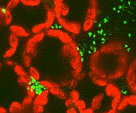Plant Pathology, Department of

Department of Plant Pathology: Faculty Publications
Document Type
Article
Date of this Version
1-31-2008
Citation
United States Patent Application Publication Pub. No.: US 2008/0028487 A1
Abstract
The bacterial plant pathogen Pseudomonas Syringae injects effector proteins into host cells via a type III protein secre tion system to cause disease. The invention relates to the discovery that the type III effector HopU1 is a mono-ADP ribosyltransferase (ADP-RT) and suppresses plant innate immunity. The HopU1 substrates in Arabidopsis thaliana extracts were RNA-binding proteins that possess RNA recognition motifs (RRMs). A. thaliana knock-out lines defective in the glycine-rich RNA-binding protein AtGRP7, a HopU1 substrate, were more susceptible than wild type plants to P syringae. The ADP-ribosylation of AtGRP7 by HopU1 required two arginines within the RRM. The inven tion provides novel methods for the modulation of the innate immune response of a plant to a biotic stress, including methods for enhancing or suppressing the innate immune response of the plant.

